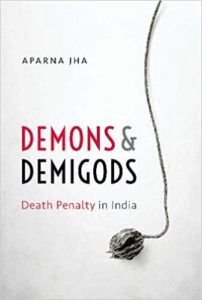In an interview with www.lifeandmore.in, the author of Demons & Demigods and Supreme Court lawyer Aparna Jha argues that capital punishment should be abolished in India
When and how did the idea of writing a book on capital punishment strike you?
I have written two books earlier –Black, White and Polka Dot and Memsahib – so basically, I have written earlier. When this case, in which I was to defend four boys on the death row, came to me, I worked very hard on it. After the matter had been finally argued, I decided to write a book based on my experiences. Usually lawyers don’t show emotion at work but this case had touched me somewhere and I wanted to write about it.
What made you choose the subject of death penalty?
Death penalty is a subject of debate not only in India but the world over. Many countries have abolished it but some others, like India, choose to retain it. My understanding of the subject was better after my research; and having seen things from close quarters, I thought this was the right topic to write a book on.

Why call it Demons & Demigods?
I saw online that the media had called my clients ‘devils’, ‘demons’ and more after 10 dead bodies were recovered from the hillock and these four boys were caught. The act was gruesome, bodies had been chopped to destroy evidence. The judges who decided the case were ‘demigods’. Only god can take away a human life and since the judges have been given this power, I decided to call them ‘demigods’.
For a lawyer to write a work of non-fiction is extremely different from arguing a case in court. How was it in your case?
Initially, this was a work of fiction but my editor, Divya Dubey, said that since the book is based on a true story, I should convert it to nonfiction. ‘I will help you in this,’ she had said. The book was re-written and this took me a year. It was a long process. Both of us worked hard. When we differed, there were fireworks. But she really took pains to polish my work.
What things did you keep in mind while writing this book?
Legal language is different. Divya would often say, ‘A, no stilted language,’ and that I was not writing a report. Nonfiction, she told me, was not very different from fiction. I had to be careful. ‘It will kill the book,’ she would often tell me, ‘if the reader found any portion boring.’ So I had to ensure that the reader found my book interesting.
In the first chapter, you write Indian law is based on the British Common Law. Thus, the Indian judicial system is pyramidical in structure, and all guidelines laid down by the top court are studied minutely and followed by the lower courts. In your opinion as a lawyer, why hasn’t these laws been changed despite the fact that we gained Independence over seven decades back?
Many legal systems the world over are based on common law — nothing wrong in continuing with it! Of course, those provisions which have become archaic should be done away with.
How have you ensured the book doesn’t become a chronicle of cases and the interest of the readers remains alive throughout?
I had to be very careful. You can get to read the cases I have discussed in my book from anywhere. My job was to present them in an interesting manner otherwise no one would read them. Holding the interest of the reader was vital.
According to Indian law, what is the definition of death penalty and what is its periodicity?
In a murder case, either they get hanged or get life imprisonment. Earlier they were transported for life but now that has gone and has been replaced with life imprisonment. Death penalty is now given only in the ‘rarest of the rare case’ in view of the law laid down by the top court in the case of Bachan Singh. But the trial courts, that is the lower courts, give a lot of death penalties and though most of them are converted to life imprisonment by the higher courts, it can be very, very traumatic. Imagine being on the death row for a decade! They are dying every day!
How difficult is it as a lawyer to try and save someone he/ she knows has killed someone?
I do not know whether my client has really killed or raped… My job is to study the papers of the case and work hard to get relief for him/ her. Most of those on the death row are poor who cannot afford lawyers to defend them properly. In a system that is so unjust and unequal, the death penalty should be done away with.
Criminal lawyers are said to get a number of threats. Have you got any?
No, I haven’t. Perhaps those who handle terror-related cases get such threats as had happened in Ajmal Kasab’ case.
Tell us about your family…
I am from Patna and studied at Notre Dame Academy. I studied political science at Miranda House and did law from Law Faculty, Delhi University. I am an advocate on record with the Supreme Court. I love reading and may be that helped in writing. My husband is also a lawyer. I have two children — Mythili and Siddid. Mythili was all India topper in humanities in 12th board examination (2015). She also topped her college (Political Science, LSR) and is presently studying law at London School of Economics where she got full scholarship. My son is in class 9 at Amity International, Noida.